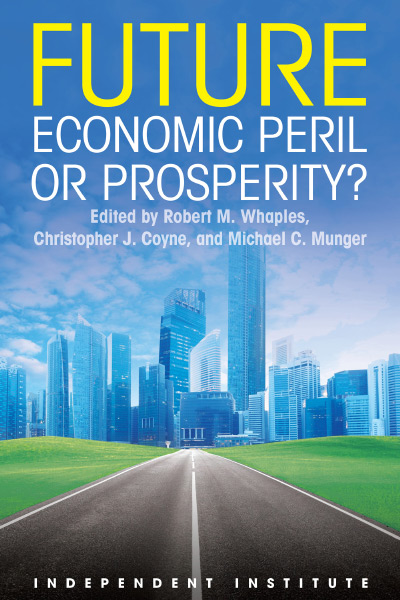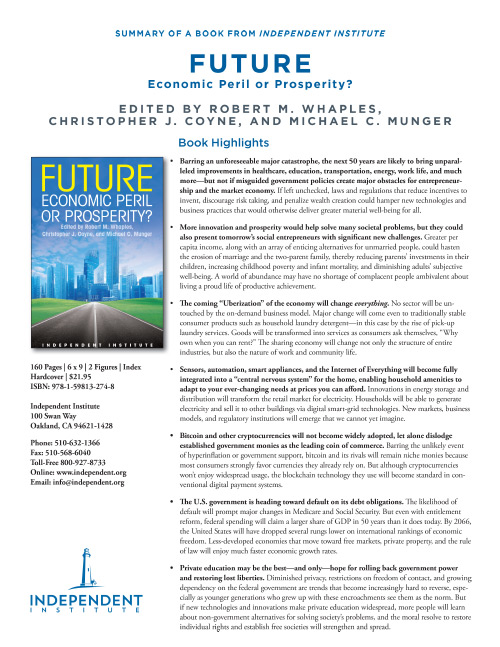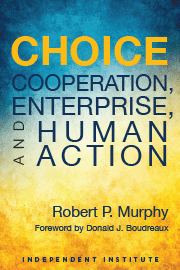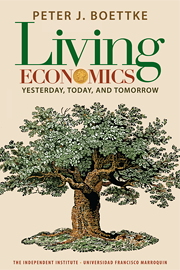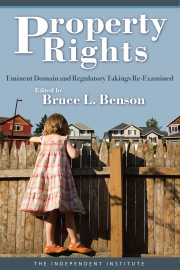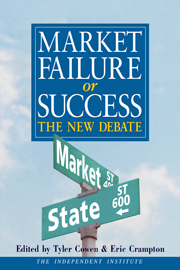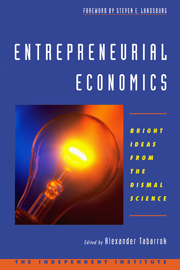| List Price: | ||
| Price: | $14.67 | |
| Discount: | $7.28 (Save 33%) |
| List Price: | ||
| Price: | $14.67 | |
| Discount: | $7.28 (Save 33%) |
Overview
What will the economy look like in fifty years? How will our lives as consumers and workers be transformed by the coming innovations in technology, the marketplace, and the workplace? How will changes in demographics and dependency affect our political system? Will economic freedom rise or fall? What, if anything, would greater prosperity do for one’s total well-being?
Future: Economic Peril or Prosperity? poses these and related questions to a diverse group of economists whose predictions will inspire thoughtful consideration and debate. As co-editor Robert M. Whaples writes in the introductory chapter, “The predicted changes range from innocent innovations that will make life a bit more comfortable...to potentially chilling technologies that might strip our human dignity.”
Just as important as the book’s predictions are its insights into how we should think about an uncertain future. As humorist and social critic P. J. O’Rourke shows in his erudite chapter on self-fulfilling prophecies, wildly wrong predictions are not limited to the likes of a Nostradamous or a Karl Marx: even a Nobel laureate economist running a billion-dollar hedge fund can lose the farm (and other people’s money) through an overly confident misreading of the economic tea leaves. And yet, perhaps only by delving more deeply into long-term forecasting, and reflecting on past mistakes, can we minimize the hubris that so often clouds the judgments of prognosticators in academia, business, and—perhaps especially—government.
Informative, contentious, and at times inspirational, Future: Economic Peril or Prosperity? is an invaluable aid for anyone who understands the need to prepare for the future, even if that future cannot be fully anticipated.
Contents
- The Economic Future: An Introduction
Robert M. Whaples - From Lemonade Stands to 2065
Pierre Lemieux - Pessimistically Optimistic About the Future
Peter J. Boettke - The Economy in 2065: Predictions and Cautions
David R. Henderson - If We Keep Our Ethical Wits, We Can See Over into a Great Enrichment
Art Carden and Deirdre N. McCloskey - The Coming of Peak Gross Domestic Product?
Brink Lindsey - Why Software Really Will Eat the World—and Whether We Should Worry
Russell D. Roberts - The U.S. Economy: The New Normal and an Unsustainable Future
Benjamin Powell and Taylor Leland Smith - Life Is a Battlefield
Janet A. Schwartz and Dan Ariely - The Uber-All Economy of the Future
J. Walker Smith - Tomorrow 3.0: The Sharing Economy
Michael C. Munger - Bitcoin and the Future of Digital Payments
William J. Luther - The Connected Home and an Electricity-Market Platform for the Twenty-First Century
L. Lynne Kiesling - If Government Were Angels, Only Humans Would Be Necessary: A Look at the Economic Prospects of 2065
Brian F. Domitrovic - The Future of the Economy: Self Fulfilling Prophecies
P. J. O’Rourke - Through the Mist: American Liberty and Political Economy, 2065
Charlotte A. Twight - Conclusion and Final Thoughts
Michael C. Munger
Notes
Glossary
References
Index
Detailed Summary
- Barring an unforeseeable major catastrophe, the next 50 years are likely to bring unparalleled improvements in healthcare, education, transportation, energy, work life, and much more—but not if misguided government policies create major obstacles for entrepreneurship and the market economy. If left unchecked, laws and regulations that reduce incentives to invent, discourage risk taking, and penalize wealth creation could hamper new technologies and business practices that would otherwise deliver greater material well-being for all.
- More innovation and prosperity would help solve many societal problems, but they could also present tomorrow’s social entrepreneurs with significant new challenges. Greater per capita income, along with an array of enticing alternatives for unmarried people, could hasten the erosion of marriage and the two-parent family, thereby reducing parents’ investments in their children, increasing childhood poverty and infant mortality, and diminishing adults’ subjective well-being. A world of abundance may have no shortage of complacent people ambivalent about living a proud life of productive achievement.
- The coming “Uberization” of the economy will change everything. No sector will be untouched by the on-demand business model. Major change will come even to traditionally stable consumer products such as household laundry detergent—in this case by the rise of pick-up laundry services. Goods will be transformed into services as consumers ask themselves, “Why own when you can rent?” The sharing economy will change not only the structure of entire industries, but also the nature of work and community life.
- Sensors, automation, smart appliances, and the Internet of Everything will become fully integrated into a “central nervous system” for the home, enabling household amenities to adapt to your ever-changing needs at prices you can afford. Innovations in energy storage and distribution will transform the retail market for electricity. Households will be able to generate electricity and sell it to other buildings via digital smart-grid technologies. New markets, business models, and regulatory institutions will emerge that we cannot yet imagine.
- Bitcoin and other cryptocurrencies will not become widely adopted, let alone dislodge established government monies as the leading coin of commerce. Barring the unlikely event of hyperinflation or government support, bitcoin and its rivals will remain niche monies because most consumers strongly favor currencies they already rely on. But although cryptocurrencies won’t enjoy widespread usage, the blockchain technology they use will become standard in conventional digital payment systems.
- The U.S. government is heading toward default on its debt obligations. The likelihood of default will prompt major changes in Medicare and Social Security. But even with entitlement reform, federal spending will claim a larger share of GDP in 50 years than it does today. By 2066, the United States will have dropped several rungs lower on international rankings of economic freedom. Less-developed economies that move toward free markets, private property, and the rule of law will enjoy much faster economic growth rates.
- Private education may be the best—and only—hope for rolling back government power and restoring lost liberties. Diminished privacy, restrictions on freedom of contact, and growing dependency on the federal government are trends that become increasingly hard to reverse, especially as younger generations who grew up with these encroachments see them as the norm. But if new technologies and innovations make private education widespread, more people will learn about non-government alternatives for solving society’s problems, and the moral resolve to restore individual rights and establish free societies will strengthen and spread.
What will the economy look like in fifty years? How will our lives as consumers and workers be transformed by the coming innovations in technology, the marketplace, and the workplace? How will changes in demographics and dependency affect our political system? Will economic freedom rise or fall? What, if anything, would greater prosperity do for one’s total well-being?
Future: Economic Peril or Prosperity? poses these and related questions to a diverse group of economists whose predictions will inspire thoughtful consideration and debate. As co-editor Robert M. Whaples writes in the introductory chapter, “The predicted changes range from innocent innovations that will make life a bit more comfortable...to potentially chilling technologies that might strip our human dignity.”
Just as important as the book’s predictions are its insights into how we should think about an uncertain future. As humorist and social critic P. J. O’Rourke shows in his erudite chapter on self-fulfilling prophecies, wildly wrong predictions are not limited to the likes of a Nostradamous or a Karl Marx: even a Nobel laureate economist running a billion-dollar hedge fund can lose the farm (and other people’s money) through an overly confident misreading of the economic tea leaves. And yet, perhaps only by delving more deeply into long-term forecasting, and reflecting on past mistakes, can we minimize the hubris that so often clouds the judgments of prognosticators in academia, business, and—perhaps especially—government.
Informative, contentious, and at times inspirational, Future: Economic Peril or Prosperity? is an invaluable aid for anyone who understands the need to prepare for the future, even if that future cannot be fully anticipated.
Future Abundance versus Government Overreach
Prominent thinkers more than a century ago often believed the march of material and moral progress was unstoppable. Today this naive viewpoint strikes us as quaint. And yet many believe that a world of widespread abundance is just over the horizon. In contrast, the contributors to Future: Economic Peril or Prosperity? believe that future prosperity is contingent on variable factors such as whether or not the legal and policy climate is conducive to innovation, private investment, and job creation.
Progress requires economic freedom, but governments routinely encroach on those freedoms. The regulatory state, as Pierre Lemieux notes, now reaches every corner of the economy, from safety standards in heavy industry all the way down to licensing requirements for running a lemonade stand. This “regulatory megatrend” will bring us to the crossroads: in one direction is a world in which government extends its tendrils more deeply in economy, damaging liberty and opportunity—in the other direction is a world in which regulatory retrenchment allows greater freedom and prosperity.
Brian F. Domitrovic casts the alternatives somewhat differently: the future will see either a government that extracts a growing share of private wealth (and piles on more anti-competitive regulations for the benefit of special interests), or a government that chooses to limit its role. Only under the latter scenario can the economy break free of the cycle of boom and bust and ride an exponential growth curve to ever-increasing, near-universal prosperity, he argues.
Government regulation often targets behavior deemed unhealthy. Janet A. Schwartz and Dan Ariely compare two strategies for dealing with the clash between short-term pleasures and long-term interests: “soft” paternalism, such as nutritional labeling, and “hard” paternalism, such as restrictions on sugary soft-drinks and other products. The best approach, they argue, may be to take a path between hard and soft paternalism, one that encourages good behavior while allowing individual choice.
Excessive taxation and regulation are not the only public-policy threats to economic progress and personal freedoms: government spending can also take a heavy toll. Benjamin Powell and Taylor Leland Smith argue that without dramatic cuts in public expenditures or significant increases in revenue, the government cannot repay its debt. But this cloud may reveal a silver lining: a fiscal crisis would likely prompt citizens and politicians to reassess the government’s role in the economy and to consider policy alternatives grounded in free markets and civil society.
David R. Henderson predicts that the U.S. government will default on its debt within the next few decades. One consequence: Medicare and Social Security will be scaled back. Yet by 2065 federal spending will account for a larger share of GDP than it does today—up to 25 percent. Greater public expenditures and decreases in economic freedom will slow economic growth in the United States and other developed countries, but economic freedom will likely improve in the developing world, leading to higher rates of economic growth.
Some of the greatest challenges to economic freedom and prosperity will come from the dynamics of government power. Charlotte A. Twight notes that the U.S. government’s vast authority over education, health care, and trade has created organized constituencies that benefit from and help to preserve government power. This unhealthy dynamic, she argues, can be stopped only if young people, encouraged by a decentralization and privatization of education, begin to think differently about the role of government and decide to push against state encroachment in all areas of life.
Prosperity and the Labor Market
Future: Economic Peril or Prosperity? is an antidote to the foreboding prophecy that the rise of robots and automation will completely displace the need for human labor. While it is true that inventions such as self-driving cars will change how much we work and what kind of work is available, a reduction in work will not mean the end of prosperity.
But it will present new challenges. Brink Lindsey warns that as technology takes over more of our economy, lower-skilled workers with scant job opportunities may drop out of the workforce altogether and become dependent on government assistance. A decline in labor hours could lead to the climax and fall of GDP. But even decline in GDP may not spell a decline in the quality of life, as greater labor productivity will lower everyone’s cost of living.
Russell D. Roberts also foresees a future of falling prices. Software innovations will make high-quality healthcare more affordable, make a good education within the reach of anyone with online access, cut traffic accidents, and improve transportation and mobility. These changes will drastically change labor markets: some workers will be displaced and others will end up working less. But software-driven progress is not inevitable: innovation-choking regulations and special-interest politicking are serious threats.
Technological Predictions
New technologies have already begun to change relationships between consumers and producers. Fostered by the Internet’s facilitation of new networks of exchange, these changes will transform the world of commerce.
Uber and Airbnb are just the tip of the iceberg, according to Michael C. Munger. The sharing economy will turn almost every product into an asset with income-earning potential, resulting in a third great economic revolution. (The Neolithic transition from nomadic hunting and gathering to agriculture and the industrial revolution were the first two.) Consumers will own less but rent more. The importance of distributors and middlemen will plummet, as individuals manage more of their own commercial interactions. Prices will fall, energy use will decline, and the environment will benefit.
As people buy less and rent more, the demand for many manufactured goods will fall, resulting in dramatic changes in employment patterns. J. Walker Smith predicts that all consumer goods will be available as a service and all consumer services will be available on demand. The on-demand, sharing economy will also usher in an even more fundamental transformation: the rise of new relationships between producers and consumers, affinity networks, and other new forms of community will change the nature and meaning of work.
What role will bitcoin and other alternative digital currencies play? While some have praised their potential, William J. Luther doubts that much will become of them. Unless they somehow manage to overcome the incumbent advantages of government-sponsored monies and reduce the costs for consumers to switch to new payment systems, bitcoin and its brethren will likely continue only as niche monies or substitutes for very weak currencies.
Technological innovation will, however, have a major impact on how we use electricity, according to L. Lynne Kiesling. More and more household products will be programmed to respond to patterns of human behavior. As machine intelligence becomes adopted in the home, electricity usage will become more efficient and less expensive. Technologically advanced homes will connect to a smart grid and be able to sell electricity.
Praise
“From P.J. O’Rourke to Deirdre McCloskey, lemonade stands to bitcoin blockchains, uber economics to omniphagic software, the power grid to the connected home, Future is a diverse and dynamic cornucopia of historians, futurists, humorists, prophets, and economists discoursing disruptively on the prospects for our 21st Century economy.”
—George Gilder, author of The Scandal of Money and Wealth and Poverty; Founding Fellow, Discovery Institute
“Future is exactly what I would expect from the Independent Institute. You will not likely have any sure answers when you finish reading this marvelous book, but I all but guarantee you that you will be asking far better informed questions than at the start. And given the confusing landscape called the future, that’s the whole point, isn’t it?”
—Tom Peters, Founder and Chairman, Tom Peters Company; Co-Founder, Skunkworks Inc.; bestselling author of In Search of Excellence: Lessons from Americas Best Run Companies (with Robert Waterman, Jr.) and other books
“No one knows what the future will bring, but we do know what policies avert economic calamity and foster widespread prosperity. Future provides a roadmap for adopting the essential measures of liberty, entrepreneurship, and innovation. I highly recommend everyone read this pioneering book.”
—Rand Paul, M.D., U. S. Senator
“Future is an immensely readable and important book by an All-Star cast of thinkers about what the future may hold for all of us and what we should do now to avert calamity. Agree or disagree with their conclusions, they will make you think deeply about the important topics of freedom, prosperity, and economics.”
—Peter F. Schweizer, President, Government Accountability Institute; bestselling author, Clinton Cash, Extortion, Throw Them All Out, and other books
“I predict that the hints of pessimism and caution expressed by the generally optimistic contributors to the book Future’s probing examination will all pale in importance relative to the achievements of the ultimate resource: The human mind.”
—Vernon L. Smith, Nobel Laureate in Economic Sciences, Chapman University
“Future is a treasure trove. It demonstrates that sound economic thinking is still alive and teeming with insight, and reminds us that whatever the future brings it is markets, not state policy, which will best get us there.”
—David A. Stockman, former Director, U.S. Office of Management and Budget; former U.S. Congressman
“Strategic thinking requires understanding of the impact and implications of our present decisions, and predictions for the next fifty years can be a valuable way to critique the state of our world today. The fascinating book Future succeeds admirably in provoking and informing about the directions our choices may take us. Those who fail to think about the future are destined to repeat the mistakes of the past!”
—Garry K. Kasparov, Chairman, Human Rights Foundation; 13th World Chess Champion; and author, Winter Is Coming
“The great philosopher Yogi Berra declared ‘Predictions are tough . . . especially about the future.’ Anyone who looks back even a decade or two will realize how difficult it was to predict where we are now. But it is still a valuable exercise to contemplate future scenarios, what might lead to good or bad outcomes and try to steer toward the former. That’s why you should read Future: Economic Peril or Prosperity?, sixteen thought-provoking essays by distinguished authors on trends and technologies, government and freedom, out to 2065. They will get you thinking, likely in new ways, about new things, that will affect all you hold dear.”
—Michael J. Boskin, Senior Fellow, Hoover Institution and T. M. Friedman Professor of Economics, Stanford University; former Chair, President's Council of Economic Advisers
“The world around us used to move slowly, hobbled by tradition, guilds and government. Capitalism and more limited government brought faster change, but was still slowed by the State’s taxation and controls. Now Technology is allowing consumers and producers to bypass the dead hand of inertia, barriers to entry, and government’s efforts to tax and control. Future shows how we will be living, learning and earning in the future—a future that has already begun to arrive. Want to know how you will learn, earn and live in the coming decades? This foresightful book outlines the transformation brought by the digital revolution and the coming future that has, in part, already arrived.”
—Grover G. Norquist, President, Americans for Tax Reform
“How can policymakers help the most people build the best lives? Thanks to rapid changes in the structure of our economy and the social fabric that underlies it, that question demands innovative thinking. But too many in the policy community seem content to rely on old arguments and shoehorn new challenges into outmoded paradigms. Future is an impressive book from challenging thinkers who invite readers to question their assumptions and look afresh at how markets, technology, and government interact.”
—Arthur C. Brooks, President, American Enterprise Institute
“What will the economy look like in fifty years? How will our lives as consumers and workers be transformed by the coming innovations in technology, the marketplace, and the workplace? How will changes in demographics and dependency affect our political system? Will economic freedom rise or fall? What, if anything, would greater prosperity do for one's total well-being? Future: Economic Peril or Prosperity? poses these and related questions to a diverse group of economists whose predictions will inspire thoughtful consideration and debate. Just as important as the book's predictions are its insights into how we should think about an uncertain future. Perhaps only by delving more deeply into long-term forecasting, and reflecting on past mistakes, can we minimize the hubris that so often clouds the judgments of prognosticators in academia, business, and (perhaps especially) government. Exceptionally and impressively organized and presented, Future: Economic Peril or Prosperity? is especially well informed and informative, occasionally iconoclastic, and at times down right inspirational. Very highly recommended for community, college, and university library Economics collections and supplemental studies reading lists, Future: Economic Peril or Prosperity? will prove to be an invaluable and insightful aid for anyone who understands the need to prepare for the future, even if that future cannot be fully anticipated. It should be noted for students and non-specialist general readers with an interest in the subject that Future: Economic Peril or Prosperity? is also available in an ebook format ($13.99)."
—Midwest Review of Books
News
| Future: Economic Prosperity or Peril? edited by Research Fellow Robert Whaples mentioned in The Journal of Economic Literature | Thu., Jul. 6, 2017 | |
| Research Fellow Robert M. Whaples, Editor of Future: Economic Peril or Prosperity? speaks at The John Locke Foundation | Mon., Jan. 16, 2017 | |
| Future: Economic Peril or Prosperity? Edited by Robert M. Whaples, Managing Editor for The Independent Review and Research Fellows Christopher J. Coyne and Michael C. Munger is reviewed on Midwest Book Review | Mon., Nov. 28, 2016 | |
| “The Gig, Sharing and Peer to Peer Economy - Policy Considerations and Constraints” Research Fellow Michael C. Munger, editor of Future: Economic Peril or Prosperity? appears in webinar Thursday, Sept. 1 10am PT | Mon., Aug. 29, 2016 |

